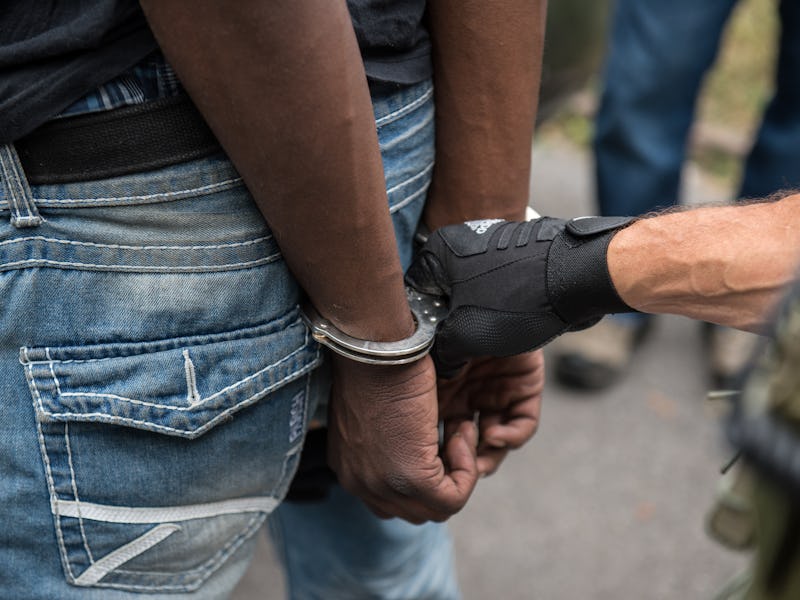On 4/20, Experts and Politicians Address Racist Marijuana Policing
Mainstream acceptance of the stoner holiday obscures pot's ugly history.

Among the marijuana users of the world, April 20 is a time to revel in all things weed-related. The unofficial holiday is earnest, silly, and, of course, chill. But according to legal scholar and racial justice expert Jody Armour, Friday’s 4/20 festivities should be weighted by the fraught history of marijuana in the United States.
“The 4/20 celebrations should be tempered by a sober recognition that many disproportionately black lives have been sacrificed on the altar of a failed drug war that was racist at its inception and in its execution,” Armour tells Inverse.
“More than just a day of celebration, 4/20 should be a day of reckoning in which liberal and progressive politicians are called out for their many years of support for a racist and wasteful war on drugs.”
That includes politicians like Senator Chuck Schumer, who on Friday announced a bill to decriminalize marijuana across the nation. While Schumer was previously against legalized weed, he changed his stance to be in line with the majority, which is to say 61 percent of American citizens who believe the drug should be legalized for recreational use.
According to Schumer, it’s not just political prudence motivating his new position. Another reason Schumer cited for his evolved stance on marijuana is the disproportionate policing faced by black and Latino communities as a result of the war on drugs. In a 2013 investigation, the ACLU found that while black and white people use marijuana at similar rates, black people are arrested four times as often as their white counterparts. According to 2017 research by the Drug Policy Alliance and Marijuana Arrest Research Project there were 60,000 marijuana possession arrests made between 2014 and 2016 in New York City — 86 percent of the people arrested were black and Latino.
Armour’s recommendation to push the 4/20 conversation towards these realities is a far cry from its current discourse, which is mostly centered around getting really high, making memes about getting really high, and going to White Castle. While the mainstream acceptance for weed on 4/20 makes it seem like we are post-prohibition, only nine states and the District of Columbia have legalized recreational marijuana. Many people convicted of marijuana-related offenses are still behind bars or unable to find work because of their criminal history.
A disparity in arrests, via the ACLU.
As with Schumer’s new found warmth towards weed, some states are taking notice and looking into changing the drug laws that have disproportionately affected people of color. Under California’s legal marijuana legislation, for example, people can petition courts to clear past marijuana convictions, and some DAs are helping expunge records automatically to make the process easier. Schumer’s proposed bill would also give redress to people with past marijuana convictions, as well as allocate funding specifically to minority-owned and women-run marijuana businesses.
On Thursday, Senator Bernie Sanders also joined efforts to make amends for the war on drugs by cosponsoring the Marijuana Justice Act, originally proposed by Senator Cory Booker in 2017. The Marijuana Justice Act is a comprehensive bill that aims to not only decriminalize marijuana, but to expunge all federal convictions for marijuana-related offenses and earmark funds to provide job training for communities harmed by the war on drugs.
There are a number of advocacy groups already fighting for people of color to get stake in an increasingly legal, lucrative industry. Organizations like Minority Cannabis Business Association, the Hood Incubator, and California Minority Alliance are working to ensure that the racialized injustice in marijuana’s history doesn’t get forgotten in the impending green rush.
The origin story of 4/20’s place in stoner lore comes from a group of friends who called themselves the Waldos — five teens from San Rafael, California who would meet up at 4:20 p.m. after school in the ‘70s to smoke weed. The group eventually went on to pal around with the Grateful Dead, bringing their stoner vernacular along with them. Today, the Waldos, who are white, enjoy cult celebrity status.
If the Waldos had been five black kids in South Los Angeles, would 4/20 exist?